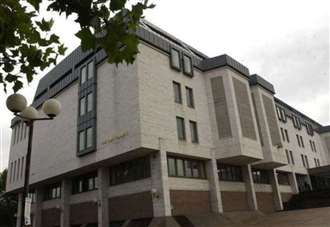More police officers being put on Kent’s streets is contributing to the crisis in the county’s crown courts, according to a new report.
Maidstone Crown Court’s caseload stands 247% higher than the national average, while Canterbury is at 102% above, as of April this year.

A paper submitted to the Kent and Medway Police and Crime Panel at Kent County Council (KCC) says a successful recruitment drive has resulted in record levels of work entering the criminal justice system.
But, the problem has been compounded in the courts by cases backed up since the pandemic, staff shortages, too few judges and barristers, and a lack of capacity at both courts.
The report compiled by Kent Police and Crime Commissioner Matthew Scott, studied by KCC’s scrutiny committee, said the bigger force resulted in more arrests and charges.
The papers stated: “For the 12-month period to April 2025, the charge rate was 9.8% compared to 8.8% in the previous 12-month period, equating to an increase of 1,293 charges entering the criminal justice system.
“The rest of the criminal justice system has not kept pace, so there are insufficient court sitting days as well as physical court capacity to meet the volume of receipts entering the system.”
Mr Scott said Maidstone’s eight courtrooms are “insufficient to meet demand” but an application for an additional two has yet to be decided upon.
The “Nightingale” court, which was previously at the Mercure hotel near Leeds Castle, has “frequently remained unused” due to a lack of court staff and judiciary.
At Canterbury, the court is starting to show signs of recovery, says Mr Scott’s report, and Maidstone cases can be transferred there.
The commissioner has long made the case for a south east “weighting” allowance to retain workers who opt to commute to London for significantly higher salaries.

Kent barrister Oliver Kirk, from Yalding, said: “The delays are absolutely appalling and those figures sound like they are probably right. The criminal justice system is completely on its knees.
“It functions but it is increasingly dysfunctional and drastic things are going to have to be done to resolve it. That means throwing a lot of money and resources at it.”
He said some Maidstone cases are being diverted to Aldersgate House and Woolwich Crown Court in London and Canterbury Crown Court to ease the burden.
Mr Kirk added: “This all came about around six weeks ago and a blitz started on cases that had been hanging around for a long time, some since Covid.

“Some of these cases are so old papers have turned to coal and the exhibits had fossilised. It’s nothing short of extraordinary and extraordinary measures are required to sort it out.”
Retired judge Sir Brian Leveson recently reported on the state of the criminal justice system and suggested ways to free the blockages in the system.
Sir Brian floated ideas such as the greater use of out-of-court resolutions, a new division of the crown court and allowing defendants in the crown court to choose to be tried by a judge alone.
Mr Kirk said the problem in Kent is caused by a number of factors, including a shortage of barristers and judges as well as court space.
He added: “This is not confined to Maidstone or Kent, however. I know of one London court where trials may not be heard until 2029 but in other places like Sussex, it is a year or under.
“And the whole process is not helped because Kent Police continue to arrest criminals.”
Mr Scott said the crisis in Kent has a detrimental effect on the victims and witnesses involved in delayed cases, and also the defendants awaiting their day in court.
He added: “Many victims feel unable to move on with their lives while their court case drags on. There is anger and frustration at repeated delays, a feeling of being let down and that justice is not being served.”

The commissioner said it is “a disappointment” the last government did not build enough prison places to meet the demand created by more police officers recruited into Kent Police.
Asked how long it might take to clear the backlogs and return the court system back to normal, Mr Scott said: “The truth is I don’t know. We just don’t have the resources and this problem will not go away until we have got those resources.”
He pointed to a shortage of Crown Prosecution Service staff, probation officers and legal advisers adding to the problems.
Kent has recruited two new Circuit Judges in the past year but each one who moves up to the bench adds to the shortage of barristers.
There are also too few probation officers in the county which also hinders the court process, particularly around sentencing.
